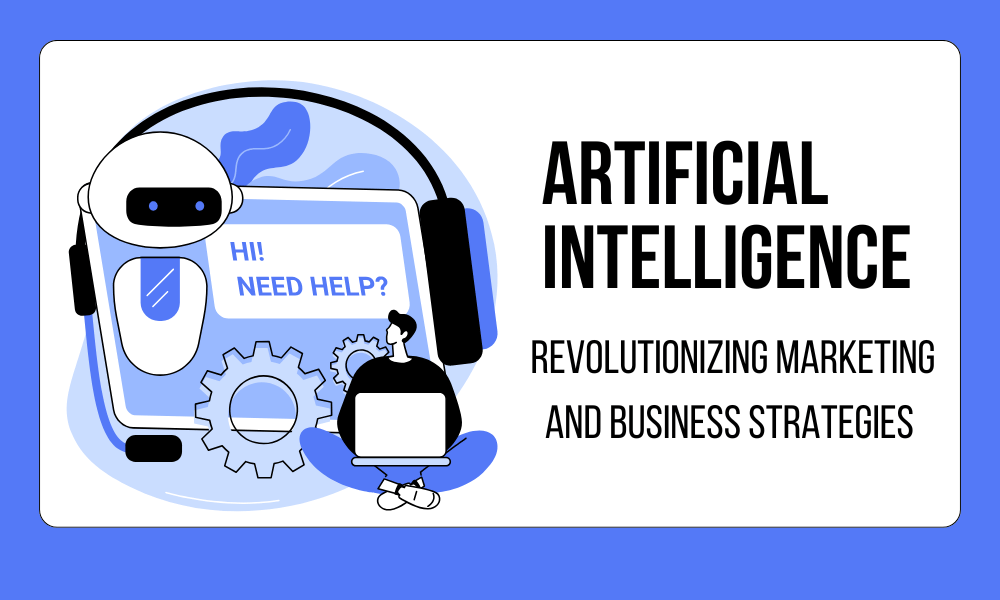Artificial Intelligence (AI) is transforming how businesses operate and engage with customers. From personalized marketing campaigns to streamlined business operations, AI is a game-changer. In this article, you’ll discover how AI is revolutionizing marketing and business strategies, providing a competitive edge for companies of all sizes.
We’ll explore AI-powered marketing strategies like customer personalization, predictive analytics, and automated customer service. You’ll see how businesses are using AI to optimize supply chains, manage workflows, and enhance decision-making processes.
AI-Powered Marketing Strategies
Personalization and Customer Insights
AI is changing the game in customer personalization. With AI, you can analyze massive amounts of data to understand customer preferences and behaviors. This means you can tailor your marketing messages and product recommendations to individual customers, boosting engagement and conversions. Personalization driven by AI isn’t just about knowing a customer’s name; it’s about predicting what they want before they know it themselves. According to a study by Epsilon, 80% of consumers are more likely to purchase from a brand that offers personalized experiences. Implementing AI/ML object storage enables the seamless handling of this vast data, making real-time personalization possible.
Predictive Analytics for Consumer Behavior
Predictive analytics uses AI to forecast future customer behaviors based on historical data. This can help you anticipate trends, identify potential churn, and optimize marketing campaigns. For example, by analyzing past purchase patterns, AI can predict what products a customer is likely to buy next, allowing you to target them with relevant offers. Businesses that use predictive analytics report a 5-10% increase in marketing effectiveness. Integrating AI/ML object storage ensures that the data needed for these predictions is readily accessible and manageable.
Chatbots and Customer Service Automation
AI-powered chatbots are revolutionizing customer service. They provide instant responses to customer inquiries, handle multiple interactions simultaneously, and operate 24/7. This not only improves customer satisfaction but also reduces operational costs. Chatbots can resolve common issues, guide customers through purchasing processes, and even upsell products. Many large businesses contact enterprise AI chatbot development service providers to build Chatbots that can resolve common issues, guide customers through purchasing processes, and even upsell products. According to a Gartner report, by 2022, 70% of customer interactions will involve emerging technologies like chatbots. Using AI/ML object storage can support the storage and processing of conversational data, ensuring that chatbots learn and improve over time.
Content Creation and Curation
AI is making content creation faster and more efficient. Tools powered by AI can generate blog posts, AI art visuals, social media updates, and even creative content based on predefined parameters. However, to ensure this content resonates with real people, many creators use AI humanizing tools to refine tone, clarity, and emotional connection. They can analyze which types of content perform best and suggest topics that are likely to engage your audience. Additionally, AI can curate content by sifting through large amounts of information to present the most relevant content to your users. This ensures your audience always has fresh and engaging material to interact with. The use of AI/ML object storage allows for the efficient storage and retrieval of vast content libraries, making content management more streamlined.
Programmatic Advertising
Programmatic advertising leverages AI to automate the buying of ads, targeting specific audiences more effectively. AI algorithms analyze data to determine the best times and places to display ads, maximizing ROI. This eliminates the guesswork and manual effort traditionally involved in ad buying. Programmatic advertising is expected to account for 86.2% of digital display ad spending by 2023, according to eMarketer. Ensuring you have robust AI/ML object storage solutions in place is crucial for handling the data and analytics that drive these sophisticated advertising strategies.
Transforming Business Operations with AI
Supply Chain Optimization
AI is revolutionizing supply chain management by improving efficiency and accuracy. Through predictive analytics, you can anticipate demand, reducing excess inventory and stockouts. AI algorithms analyze vast amounts of data, identifying patterns and trends that humans might miss. This helps optimize logistics, minimize costs, and improve delivery times. A study by McKinsey found that AI-driven supply chain management can reduce forecasting errors by up to 50%. Collaboration AI also enables seamless communication between suppliers and manufacturers, ensuring a smooth and responsive supply chain.
Automated Workflow and Task Management
Automating workflows with AI frees up valuable time and resources. AI tools can handle repetitive tasks like data entry, appointment scheduling, and email sorting. This not only boosts productivity but also reduces human error. By automating mundane tasks, your team can focus on more strategic activities. Workflow automation software like Zapier or Monday.com uses AI to streamline processes, ensuring that tasks are completed efficiently and on time. Implementing AI-driven task management can lead to significant time savings and increased operational efficiency.
AI in Human Resources and Talent Acquisition
AI is transforming HR by enhancing the hiring process and improving employee management. AI-powered tools can screen resumes, identify the best candidates, and even conduct initial interviews. This speeds up recruitment and ensures you find the right talent faster. AI can also analyze employee performance, predict turnover, and suggest training programs. By using AI for talent acquisition, you can reduce bias, enhance diversity, and improve overall HR efficiency. According to a LinkedIn report, 67% of hiring managers say AI helps them save time during the recruitment process.
Enhancing Decision-Making Processes
AI enhances decision-making by providing data-driven insights. Machine learning algorithms analyze historical data to predict future outcomes, helping you make informed decisions. For example, AI can forecast sales trends, identify market opportunities, and suggest pricing strategies. This allows you to stay ahead of the competition and adapt to changing market conditions. Decision-making is further improved through collaboration AI, which facilitates better communication and information sharing among team members, ensuring that everyone is on the same page.
Risk Management and Fraud Detection
AI is crucial in identifying and mitigating risks. By analyzing data patterns, AI can detect anomalies and potential threats. This is especially useful in financial services, where AI can spot fraudulent transactions in real-time. AI models can also predict and prevent cybersecurity threats, protecting your business from data breaches. Implementing AI for risk management not only enhances security but also ensures compliance with regulations. A report by PwC indicates that AI can reduce false positives in fraud detection by up to 90%, making it a powerful tool for safeguarding your business.
Case Studies and Real-World Applications
Success Stories from Major Corporations
Leading corporations have harnessed the power of AI to achieve remarkable results. Take Amazon, for example. Their recommendation engine, powered by collaboration AI, drives 35% of their sales. By analyzing browsing habits and purchase history, Amazon delivers personalized suggestions that keep customers coming back.
Another success story is IBM’s Watson, which helped the healthcare sector. Watson’s AI capabilities assist doctors in diagnosing diseases faster and more accurately. In fact, Watson’s ability to analyze vast amounts of medical data has reduced diagnostic errors by 30%. These real-world applications show how AI can lead to significant advancements and efficiencies.
AI in E-commerce: Transforming Retail Experiences
E-commerce giants are leveraging AI to revolutionize the shopping experience. AI-powered chatbots, like those used by H&M, offer 24/7 customer service, answering queries and providing product recommendations. This improves customer satisfaction and boosts sales.
Additionally, AI-driven inventory management systems predict stock needs based on historical data and current trends. For instance, Zara uses AI to analyze sales and social media trends, ensuring they stock the right products at the right time. This approach minimizes overstock and reduces waste.
The Impact of AI on Small and Medium Enterprises (SMEs)
Small and medium enterprises (SMEs) are also benefiting from AI. Tools like collaboration AI help SMEs streamline operations without needing extensive resources. For example, AI-driven marketing platforms enable SMEs to run targeted ad campaigns with precision, reaching the right audience and maximizing ROI.
AI-powered CRM systems, such as Salesforce Einstein, provide SMEs with deep customer insights. These insights allow for more personalized marketing efforts, driving customer loyalty and increasing sales. By adopting AI, SMEs can compete with larger corporations more effectively.
Lessons Learned from AI Implementation Failures
Not all AI implementations succeed. Companies can learn from past mistakes to avoid pitfalls. A notable example is Microsoft’s Tay, an AI chatbot released on Twitter. Tay was designed to learn from interactions but quickly began to mimic and amplify inappropriate behavior, leading to its shutdown within 24 hours.
Another lesson comes from IBM’s Watson in oncology. Despite initial success, Watson faced criticism for inconsistent treatment recommendations. The issue highlighted the importance of continuous training and human oversight in AI applications. These failures underscore the need for thorough testing and ethical considerations in AI development.
Future Trends and Emerging Technologies
Looking ahead, collaboration AI and other emerging technologies promise exciting advancements. Expect to see more integration of AI with Internet of Things (IoT) devices, enhancing automation and data collection. This will lead to smarter homes and businesses.
AI’s role in predictive analytics will grow, providing deeper insights into market trends and consumer behavior. Moreover, AI-driven personalization will become even more sophisticated, offering hyper-targeted marketing strategies.
Conclusion
AI is rapidly changing the marketing and business world. Its ability to personalize experiences, predict consumer behavior, and automate tasks is giving companies a significant advantage. Businesses are not just optimizing processes; they’re transforming them entirely.
Think about the impact of AI-powered marketing strategies. Personalization and predictive analytics let you target the right customers at the right time. Automated chatbots enhance customer service, ensuring immediate responses and satisfaction. Content creation tools streamline your marketing efforts, making campaigns more effective and efficient.




Leave A Comment
You must be logged in to post a comment.